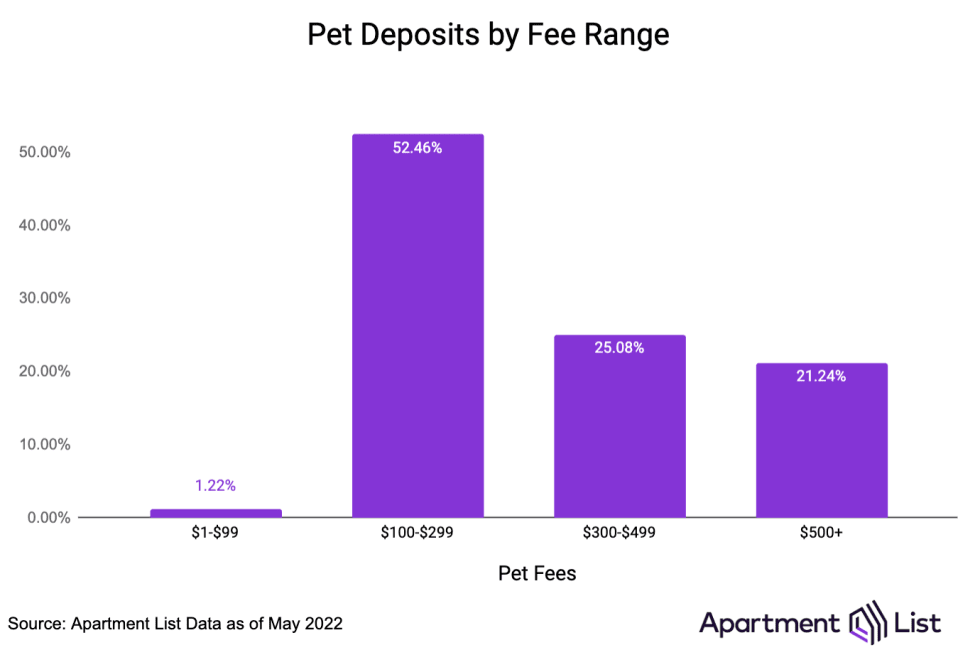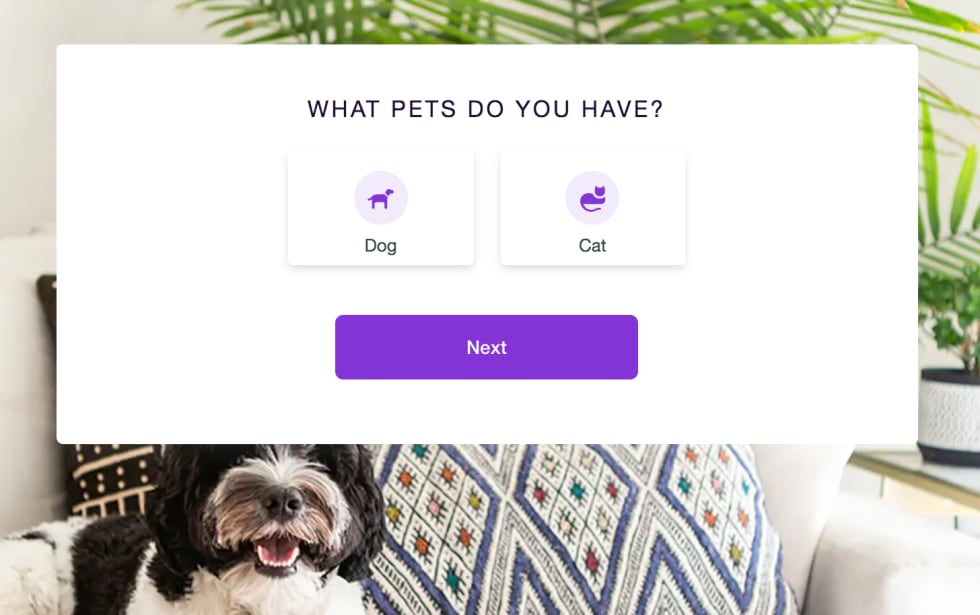10 Tips for Finding Pet-Friendly Apartments

Looking for the purr-fect apartment for you and your furry friend? No more worries! Join us today as we unravel the secrets to finding a pet-friendly apartment. Let's make your search an exciting walk in the park!
1. Read Up on Pet Restrictions and Local Regulations
Every landlord has a different pet policy, but most have one or more of the following rules for renting with pets. Below are a few of the common restrictions you'll see.
Limit on the Number of Pets
Most apartment buildings limit residents to a total of 1 or 2 pets.
Weight Restrictions
Some apartments do not allow (or may charge additional fees for) dogs over 55 lbs.
Aggressive Dog Breeds
Many landlords will not allow residents to bring dog breeds that are deemed “aggressive”. There’s no set list, and breed restrictions can vary from complex to complex.
Below is a typical aggressive dog breeds list for apartments.
- Pit Bulls
- Dobermans
- Rottweillers
- German Shepherds
- Great Danes
- Alaskan Malamutes
- Terriers
This list may vary, but these are a few of the commonly restricted breeds. While your pet may be harmless, most landlords (and insurance companies) find these breeds to be risky tenants!
2. Offer to pay pet fees and pet deposit
In our experience, almost all apartments require tenants to pay a premium for bringing your canine or feline friend along. Some states and cities place limits on these fees, so you may want to research local regulations if your landlord requires payments that are astronomically high.
You'll typically see these three types of costs associated with renting with pets:
Pet Fees
This is a one-time cost you'll pay when moving in with your pet. Unlike a pet deposit, this is nonrefundable.
Pet Deposits
A refundable deposit that you’ll get back after your lease ends unless there damage caused by your pet. 40% of apartments that are pet-friendly require a deposit. The average pet deposit is $287.

Pet Rent
An extra $25-$100 may be added to your monthly rent if you are renting with a pet.
3. See if you Qualify for a Service Animal
Note that people with disabilities have a right to have service or emotional support pets, even if the leasing agreement specifically prohibits pets. You do not have to disclose your disability to the landlord. Additionally, service animals are not subject to pet fees.
4. Build a Pet Resume
The list of fees and restrictions can be daunting. However, many landlords and property managers can be flexible with policies if you can show that you and your pet are responsible tenants.
If you want to find a pet-friendly apartment, make sure to prepare a pet resume ahead of time. Yes, we know it sounds a bit strange. Just consider a pet resume as a way to showcase your pet. It can also help make the screening process go faster.

Include the Following Information in your Pet Resume:
- Photo
- A description of your pet including name, breed, and weight.
- Previous health records showing proof of vaccinations
- Any training certifications.
The American Kennel Club provides a good example of what your pet resume should look like and include. A letter of recommendation from previous landlords and neighbors helps too!
5. Promote Yourself and Your Pet
If you want to succeed in finding a pet-friendly apartment, you have to promote your furbaby. Let your landlord know you share similar concerns about cleanliness. Express that your pet is potty-trained, vaccinated, flea-controlled, etc.
Getting a training certificate like the Canine Good Citizen’s for dogs is a good way to prove to your landlord your pet would be a good tenant.
6. Consider Purchasing Renters Insurance
Finding a pet-friendly apartment isn't an easy task. Liability is a top concern for landlords, and one of the main reasons landlords are against pets.
Landlords will feel more comfortable allowing pets if they are insured - this can be especially helpful if you have an aggressive breed. Be sure to find out whether your insurance has a dog bite exclusion, dangerous breed exclusion or other limitations.
Note that most rental insurance companies do not cover dog bites, so you may need to get a separate pet insurance policy. The Federation of Insured Dog Owners will provide canine liability insurance policies for all breeds of dogs.
As we mentioned, many apartment buildings limit the number of pets a tenant is allowed to have in their home. Landlords are much more likely to allow a fixed animal than one that could potentially have offspring bringing the apartment’s total pets way past the accepted amount.
7. Consider Private Landlords
While searching for a pet-friendly apartment, management companies can have pretty strict no-pet policies. Typically, these situations have the least amount of flexibility.
But, you might want to consider looking for a private landlord as an alternative option. You’ll find that private landlords tend to be easier to negotiate with, as it is ultimately their decision whether or not to allow pets.
8. Think About Applying for an Emotional Support Animal
If you’re still having trouble finding a pet-friendly apartment, you might want to think about applying for an emotional support animal (ESA). You should only go through the application process for an ESA if you genuinely need one to help protect the rights of those in need.
But, if you do have an emotional disability and have been certified as emotionally disabled by a duly licensed certified mental health professional, you can obtain an ESA letter.

9. Try Introducing Your Pet to the Manager
Another option is to try introducing your pet to the manager. Invite the landlord to visit you and your pet in your current home or offer to bring your pet to meet them. It will speak volumes for them to see your well-behaved and freshly groomed pet.
Many landlords are worried about how the property will be maintained with a pet, which you can provide some relief by emphasizing that the same pride you take in caring for your pet extends to taking care of your home.
Other concerns may come with flea or pest control issues with pets. You can assure your landlord that your pet is on preventative care and even ask for a note from your veterinarian proving so.
10. Find Your Pet-Friendly Apartment Online
Finally, we at Apartment List are here to help! You can use our site to search for apartments that allow dogs or cats, making it easy for you to find the perfect place for you and your furry friend.
Just take our quiz asking a couple of questions about your preferred location and amenities, and we'll put together a list of pet-friendly apartments that match your criteria.

Discover your dream pet-friendly apartment today! We've teamed up with apartment complexes to bring you the most comprehensive information on pet policies. From pet fees to deposits, we've got you covered. Don't let unanswered questions hold you back - explore our ultimate guide to renting with pets for all the answers you need. Renting with pets has never been easier!
Dog Breed Restriction FAQs
What is Considered a Large Dog for Apartments?
Your landlord's idea of a large dog may vary depending on their personal preference and the property itself. However, most landlords set a limit of 20 to 50 pounds, which also coincides with the weight of most aggressive dog breeds.
What is Considered a Small Dog for Apartments?
Most small dogs are 20 pounds or less, but restricted dog breeds are more about the weight limit. Your landlord may not care if you have a 50-pound dog, provided it's not on a restricted breed list.
What is Considered an Aggressive Dog Breed?
Aggressive dogs are categorized by their threat to other people and animals. The breed's history of attacks, barking, lunging, snapping, and overall body language are all ways that dogs end up on the restricted breed list.
How Do Apartments Verify Dog Breeds?
Pet medical records are usually required to verify your dog's breed. Depending on your landlord, they may also need a DNA test.
Why Do Apartments Have Weight Limits for Dogs?
Weight restrictions are often in place to prevent property damage, noise complaints from other tenants, and unforeseen issues. For example, a large dog is likelier to intimate tenants than a smaller one.
What States Have Breed Restrictions?
Some cities and counties ban entire dog breeds, particularly pit bulls. To date, there are no state-specific bans. Some states prohibit breed-specific local ordinances, including:
- California
- Colorado
- Florida
- Illinois
- Maine
- Massachusetts
- Minnesota
- New Jersey
- New York
- Oklahoma
- Pennsylvania
- Texas
- Virginia
Remember, there's a difference between state-specific bans and apartment bans. Your city may not ban pit bulls, but your landlord can still restrict the breed from the building.
Share this Article




